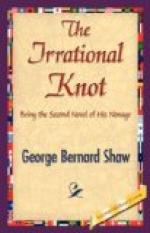“Ah,” said Conolly, relaxing. “Come now, I can tell you that easily enough. I dont know what it is, but I know what it does, and I can lay traps to catch it. Here now, for instance——”
And he went on to deliver a sort of chatty Royal Institution Children’s Lecture on Electricity which produced a great impression on Marian, who was accustomed to nothing better than small talk. She longed to interest him by her comments and questions, but she found that they had a most discouraging effect on him. Redoubling her efforts, she at last reduced him to silence, of which she availed herself to remark, with great earnestness, that science was a very wonderful thing.
“How do you know?” he said, a little bluntly.
“I am sure it must be,” she replied, brightening; for she thought he had now made a rather foolish remark. “Is Lord Carbury a very clever scientist?”
Conolly looked just grave enough to suggest that the question was not altogether a discreet one. Then, brushing off that consideration, he replied:
“He has seen a great deal and read a great deal. You see, he has great means at his disposal. His property is as good as a joint-stock company at his back. Practically, he is very good, considering his method of working: not so good, considering the means at his disposal.”
“What would you do if you had his means?”
Conolly made a gesture which plainly signified that he thought he could do a great many things.
“And is science, then, so expensive? I thought it was beyond the reach of money.”
“Oh, yes: science may be. But I am not a scientific man: I’m an inventor. The two things are quite different. Invention is the most expensive thing in the world. It takes no end of time, and no end of money. Time is money; so it costs both ways.”
“Then why dont you discover something and make your fortune?”
“I have already discovered something.”
“Oh! What is it?”
“That it costs a fortune to make experiments enough to lead to an invention.”
“You are exaggerating, are you not? What do you mean by a fortune?”
“In my case, at least four or five hundred pounds.”
“Is that all? Surely you would have no difficulty in getting five hundred pounds.”
Conolly laughed. “To be sure,” said he. “What is five hundred pounds?”
“A mere nothing—considering the importance of the object. You really ought not to allow such a consideration as that to delay your career. I have known people spend as much in one day on the most worthless things.”
“There is something in that, Miss Lind. How would you recommend me to begin?”
“First,” said Marian, with determination, “make up your mind to spend the money. Banish all scruples about the largeness of the sum. Resolve not to grudge even twice as much to science.”
“That is done already. I have quite made up my mind to spend the money. What next?”




